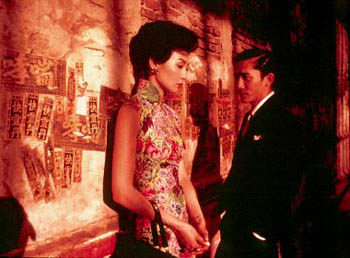![[Metroactive Movies]](/movies/gifs/movies468.gif)
[ Movies Index | Show Times | San Jose | Metroactive Central | Archives ]
 Look Back in Languor: Wong Kar-wai's 'In the Mood for Love,' starring Maggie Cheung and Tony Leung, takes place in a time-capsule Hong Kong. Stalemated Perfect for each other, Maggie Cheung and Tony Leung can never connect in 'In the Mood for Love' The cult of Wong Kar-wai baffles me, even though I greatly admire his technique. His newest and best, In the Mood for Love, is like hiding from the rain for hours at the most chic tropical bar, where everything is frozen in 1962. There are neon colors and humidity and Nat King Cole singing "Green Eyes" in Portuguese in the background. Maggie Cheung saunters by modeling one of the several dozen silk Suzy Wong dresses she wears in this film. The languid surroundings mesmerize you. Then it comes, that feeling: even in the most comfortable bar, you're eventually struck by that urgency to get up and go. In the Mood for Love tells the story of an adulterous romance between the journalist and yearning fiction writer Mr. Chow (Tony Leung) and his next-door neighbor, a secretary named Mrs. Chan (Cheung). Both live in a cramped apartment house. Both are glumly overworked; their lives take place in their offices, or in a depopulated stage-set Hong Kong consisting of one rainy street, one empty cafe and one staircase leading to a take-out noodle shop. Their eagle-eyed landlady (Rebecca Pan) keeps this man and woman from fraternizing. They're also held back by their off-camera mates, even though the absent husband and wife, who we never see, are both stridently unfaithful. It's clear that Mrs. Chan and Mr. Chow are the only man and woman in the world for each other, held apart by the vows of marriage and fear for their reputations. The love affair is in a stalemate from beginning to end. Maybe In the Mood for Love defies our crass American longing for happy endings, our immaturity in not being Buddhist enough to understand that all life is suffering. I'd buy that argument if it weren't for the strong American and French movie influences in Kar-wai, a director under the spell of everything from Last Year at Marienbad to Singin' in the Rain to Stranger Than Paradise. From Jarmusch, Kar-wai learned his relentless repetition of a musical theme. In Chungking Express, Kar-wai made me dread a new hearing of "California Dreaming," a song I'd always liked. It's as if he were one of those pot-smoking buddies who'd insist on playing the solo from "Black Magic Woman" over and over again to make sure you'd heard every nuance. In the Mood for Love stresses the contrast of hard work with romantic rhapsody--work, and not death, is the opposite of love. The art direction and photography (Christopher Doyle and Mark Li Ping-bin) are justly praised for their almost tangible visual richness. The film ends in startling abstraction. Kar-Wai cut and recut this very troubled film; the result is something remote, deliberately part of a world submerged in the past. Avoiding the cheapness of old romantic movies, Kar-wai took the other path. As an art movie, it's all art and no movie. Watching it, you sigh, "Ah, how romantic," "Yes, how cruel the demands of duty," without feeling any emotions whatsoever.
In the Mood for Love (PG; 98 min.), directed and written by Wong Kar-wai, photographed by Christopher Doyle and Mark Lee Ping-bin and starring Maggie Cheung and Tony Leung, opens Friday at the Camera One in San Jose and at Century Cinema 16 in Mountain View.. [ San Jose | Metroactive Central | Archives ]
|
From the February 15-21, 2001 issue of Metro, Silicon Valley's Weekly Newspaper.
Copyright © 2001 Metro Publishing Inc. Metroactive is affiliated with the Boulevards Network.
For more information about the San Jose/Silicon Valley area, visit sanjose.com.